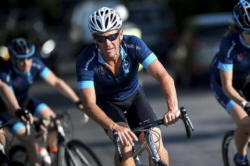|
 Lance
Armstrong disgrace revisited as crime movie in 'The Program' Lance
Armstrong disgrace revisited as crime movie in 'The Program'
 Send a link to a friend
Send a link to a friend
[September 15, 2015]
By Alastair Sharp
TORONTO (Reuters) - The
rise and fall of Lance Armstrong, from cancer-beating
Tour de France champion to admitted drug cheat, made for
an epic heist flick, said the director of "The Program,"
which had its world premiere at the Toronto
International Film Festival on the weekend.
|
|
"I think it is a crime story, I think it's a heist movie,"
British director Stephen Frears said. "He pulled it off and then
he threw it all away."
Texas-born Armstrong raised hundreds of millions of dollars as
the public face of a cancer charity while winning seven Tour de
France races between 1999 and 2005, victories he was stripped of
in 2012 after being condemned as a doping mastermind.
After years of denials, Armstrong in 2013 admitted to doping. He
is still fighting a lifetime ban and a $100 million lawsuit.
"He's America's Jesus Christ on a bicycle. He comes back from
the dead, he heals the sick, and then we found out that our Son
of God is a doping liar. And now we've banished him," said Ben
Foster, who plays Armstrong.
Foster said he took performance-enhancing drugs while filming to
get a better feel for his character.
"I wanted to understand the culture on a cellular level," he
said of the method-acting technique. "I believe Lance saw the
world differently after he survived cancer. After that he came
to the conclusion winning is life, and losing is death."
"The Program" documents the dark side of professional cycling,
which still struggles to shake off suspicions of cheating amid a
culture of loyalty to a team's star.
[to top of second column] |
"It's a profession in which people other than Lance Armstrong are
called domestiques," Frears said, referring to the French word for
servant. "The hierarchy is quite powerful."
It was Armstrong's decision to return from retirement in 2009 that
ultimately proved his downfall, turning fellow riders like Floyd
Landis against him.
Chris O'Dowd plays Sunday Times journalist David Walsh, who was
suspicious of Armstrong from early in his inspirational journey from
hospital bed and wheelchair to Tour de France podium.
Walsh's book, "Seven Deadly Sins: My Pursuit of Lance Armstrong,"
forms the narrative backbone for the film, with help from the 2012
report of the United States Anti-Doping Agency that said Armstrong's
career was "fueled from start to finish by doping."
"It's such an incredible story, that this man defeats cancer and
wins the Tour de France; you wouldn't believe it if it was fiction,"
O'Dowd said.
(Reporting by Alastair Sharp; Editing by Jill Serjeant and Richard
Chang)
[© 2015 Thomson Reuters. All rights
reserved.] Copyright 2015 Reuters. All rights reserved. This material may not be published,
broadcast, rewritten or redistributed. |